 Petzlover
Petzlover Labrador Husky is originated from Canada but Soft-Coated Wheaten Terrier is originated from United Kingdom. Labrador Husky may grow 21 cm / 9 inches higher than Soft-Coated Wheaten Terrier. Labrador Husky may weigh 25 kg / 56 pounds more than Soft-Coated Wheaten Terrier. Both Labrador Husky and Soft-Coated Wheaten Terrier has almost same life span. Both Labrador Husky and Soft-Coated Wheaten Terrier has almost same litter size. Both Labrador Husky and Soft-Coated Wheaten Terrier requires Moderate Maintenance.
Labrador Husky is originated from Canada but Soft-Coated Wheaten Terrier is originated from United Kingdom. Labrador Husky may grow 21 cm / 9 inches higher than Soft-Coated Wheaten Terrier. Labrador Husky may weigh 25 kg / 56 pounds more than Soft-Coated Wheaten Terrier. Both Labrador Husky and Soft-Coated Wheaten Terrier has almost same life span. Both Labrador Husky and Soft-Coated Wheaten Terrier has almost same litter size. Both Labrador Husky and Soft-Coated Wheaten Terrier requires Moderate Maintenance.
 The Labrador Husky is a purebred, spitz-type dog which looks much like a Wolf. People think because it has the name Labrador Husky it is a cross between a Husky and Labrador. What it essentially means is that it is a Husky dog which comes from the region of Labrador, Canada.
The Labrador Husky is a purebred, spitz-type dog which looks much like a Wolf. People think because it has the name Labrador Husky it is a cross between a Husky and Labrador. What it essentially means is that it is a Husky dog which comes from the region of Labrador, Canada.
It is a fairly unknown breed, but it is strongly believed that the dog was developed in Labrador, a region of northern Canada. In fact this is where the dog got its name from.
The attractive dog was used for sledding and it is also thought that the people of Labrador introduced Alaskan Malamute and German Shepherd in to add in some additional skills from these two dog breeds. The dogs were later domesticated so as to become companion animals.
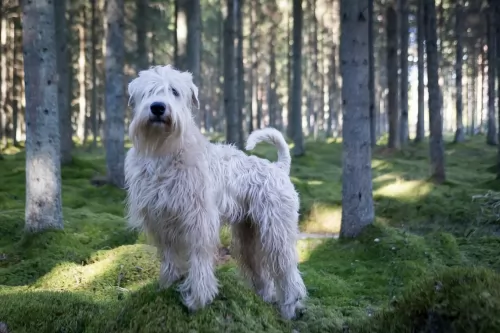 This wheaten colored terrier hails from Ireland. Although the Wheaten has been around for a long time, it was in 1937 that he was recognized as a breed in Ireland.
This wheaten colored terrier hails from Ireland. Although the Wheaten has been around for a long time, it was in 1937 that he was recognized as a breed in Ireland.
The British Kennel Club also recognized the Wheaten and the dog was also exported to the United States. Serious interest started being shown for the Terrier in the 1970s. It was in 1973 that they were recognised by the American Kennel Club.
 The wolf-like muscular Labrador Husky is a large dog standing at 51 to 71 cm in height and weighing 27 to 45 kg.
The wolf-like muscular Labrador Husky is a large dog standing at 51 to 71 cm in height and weighing 27 to 45 kg.
Labrador is a place known for its icy winters and the dog’s double coat protects it from the freezing temperatures.
The color of the coat can be white, grey and white, solid black, solid grey as well as red and white. In fact there can be several different coat colors in one litter.
He has a long muzzle like the wolf and blue or brown slanted eyes. Sometimes you’ll get one blue eye and one brown eye. He has pointed ears, a nose which can be black or a pinkish color, bushy tail and paws which are webbed.
Labrador Huskies make wonderful pets and they are good with children, particularly when they’ve been properly trained and socialized.
Because they are dogs which have worked in a pack, they also get on well with other dogs in the home. You’ll notice that your Labrador Husky won’t often bark but he will howl like a wolf.
He is a friendly dog and not aggressive. He is intelligent too and you can teach him some basic commands such as sit, stay and lie-down.
The Labrador Husky is a dog used to having a job so if you bring him into your home, you’ll need to ensure that you set aside time to exercise him as he will become frustrated and bored if he isn’t involved in your family life.
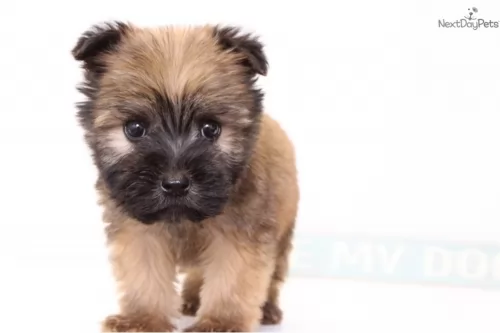 The Wheaten is a medium sized dog standing at between 43 and 50cm and weighing between 13 and 20kg both male and female. The coat of the dog is soft, silky and wavy to even curly and is a wheaten to ginger color.
The Wheaten is a medium sized dog standing at between 43 and 50cm and weighing between 13 and 20kg both male and female. The coat of the dog is soft, silky and wavy to even curly and is a wheaten to ginger color.
The coat of the puppy is dark but as he grows up it changes into the wheaten color although the ears may be a dark brown color. Pet owners like that the Wheaten is a very low shedding dog.
Playful, social and friendly, the Wheaten has always been put to good use on the farm. These days he is pet and companion. He is energetic and playful so children love having him around.
He is slightly more hyper and energetic than other Terrier breeds so will require a good dose of exercise.
He is smart and strong willed, and training and socialization turns him into an amicable pet to have around, so much so that he is sought after as a therapy-dog.
They’re easy-going dogs with no aggression issues but they still make great watch dogs and want to do whatever it takes to look after- and protect their human family.
 A Labrador Husky is a loyal, affectionate dog who is capable of forming a strong bond with his human family.
A Labrador Husky is a loyal, affectionate dog who is capable of forming a strong bond with his human family.
As a working dog, he loves being busy with fun and games and is playful and energetic and has good looks on his side too.
He is also an intelligent dog, strong-willed and confident and will require a firm, consistent owner who understands his need for regular exercise.
Social, lively and robust, the right environment will bring out all this beautiful dog’s best characteristics.
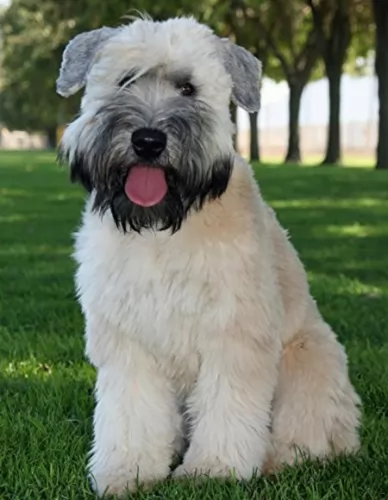 The Soft Coated Wheaten Terrier has always made an excellent farm dog, but today he is more suited as pet and companion.
The Soft Coated Wheaten Terrier has always made an excellent farm dog, but today he is more suited as pet and companion.
He adapts easily to life in the city or the countryside. Wherever he is, he will need his exercise. He also longs to be an active part of his human family, and then he’s happy, lively, social and friendly and is a great playmate for children.
 Labrador Huskies can live to be between 10 and 13 years of age, and within a loving home he is generally looked upon as a healthy breed.
Labrador Huskies can live to be between 10 and 13 years of age, and within a loving home he is generally looked upon as a healthy breed.
There are always typical dog problems that might be found in your dog, and a couple of the more prominent ones are listed -
It can be a sad day for your Labrador Husky if he is diagnosed with hip dysplasia because if he is still used as a pack dog for pulling sleds it could well put him out of a job that he thrives on. It is a problem in the hips, and your once active dog may be in pain and may even battle to stand up after lying down.
He could even develop arthritis which can cripple him. He’ll need to get to the vet so that treatment can make life comfortable for him and to assist with pain.
Deep chested dogs are more prone to bloat, and your Labrador Husky is a deep chested dog. The stomach of the dog expands with gas, blocking gas escaping and putting pressure on the abdominal organs of the dog.
In some cases the stomach can twist and then immediate surgery will be required. This is a life threatening illness. Try and avoid feeding your dog one large meal and feed him smaller meals instead. These days you also get feeding bowls that encourage slower eating.
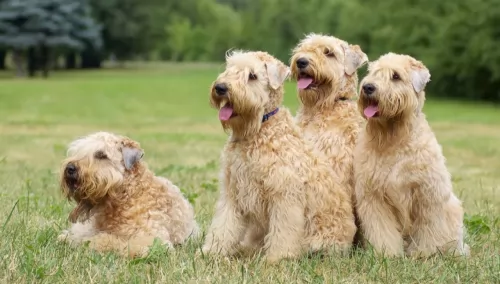 When you bring a Wheaten Terrier into your home, you’re not likely to have too many vet fees as he tends to be a healthy dog breed, being able to reach 13, 14 or 15 years of age with good care.
When you bring a Wheaten Terrier into your home, you’re not likely to have too many vet fees as he tends to be a healthy dog breed, being able to reach 13, 14 or 15 years of age with good care.
Look out for a dog ailment known as Protein-losing enteropathy (PLE). This is a condition where the dog isn’t able to properly absorb protein in the digestive tract, so that it is passed in their stools.
It can be fatal, but if caught early, some dietary changes can keep it under control.
Also, look out for inflammatory bowel disease. This disease occurs when the stomach of the dog has a large number of inflammatory cells which can change the lining of the digestive tract, preventing the normal absorption of food.
 You’ll want to introduce a proper grooming routine for your pet as he has a thick double coat and he sheds throughout the year. Brush the thick coat 2 or 3 times a week, and set aside time to check for fleas and ticks and any appearance of lumps.
You’ll want to introduce a proper grooming routine for your pet as he has a thick double coat and he sheds throughout the year. Brush the thick coat 2 or 3 times a week, and set aside time to check for fleas and ticks and any appearance of lumps.
These are dogs which require a lot of vigorous exercise. Left chained or ignored he can become frustrated, run-down, bored and sick. He is a living, social animal that should only be brought into a household that acts responsibly towards him.
Choose high quality food which is for high energy dogs. If you give him dry kibble, mix in some home-made food occasionally to add variety, and also try to include some raw meat from time to time. Always ensure fresh, cool water is available.
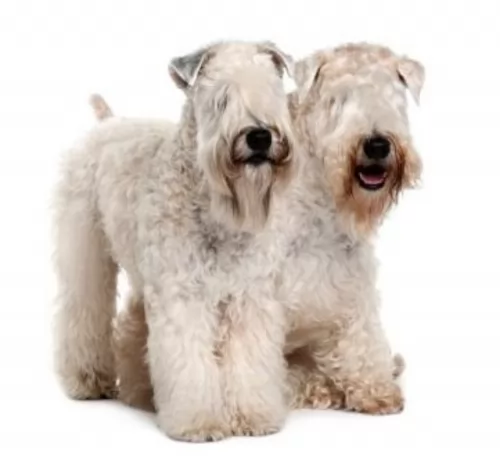 Brush your pet’s silky coat twice a week. Such a silky coat can get all tangled and matted. If you prefer, many people opt to rather have the Wheaten’s coat professionally clipped as then it is easier to handle. They like to have the hair clipped that hangs over the dog’s eyes.
Brush your pet’s silky coat twice a week. Such a silky coat can get all tangled and matted. If you prefer, many people opt to rather have the Wheaten’s coat professionally clipped as then it is easier to handle. They like to have the hair clipped that hangs over the dog’s eyes.
Other grooming tasks require you to check inside his ears for redness which could indicate an infection. Trim his nails and check him over for ticks and fleas.
Have your Wheatie trained and socialized as he is a stubborn dog breed and you want him to be well mannered and obedient.
Terriers like this are energetic dogs and he is going to need exercise every day. A walk for a dog is always a welcome experience as it gives him the opportunity to sniff around and pick up new smells. Play ball- or frisbee games with him as this can tire him out a bit.
If your dog shows signs of illness, get him to the vet. He is such a feisty dog that it can be unbearable to see him out of sorts.
Terriers are energetic dogs so if you feed your dog one of the commercial dog foods, make sure the label indicates what food it is. This is because the foods are manufactured according to the type of dog it is, its age, size and energy levels.
Always try and go for the high quality foods which don’t have all those unhealthy ingredients in them. Try to include some home-made food – nothing exotic and spicy – just plain, wholesome food that won’t upset his stomach.
Boiled chicken, brown rice or pasta and spinach, sweet potatoes and carrots is super tasty and nutritious. You can chop it up and add it to your pet’s kibble twice a week.
Try and include a little bit of raw meat to his diet occasionally as this can go towards ensuring he doesn’t get skin diseases. Always ensure he has a constant supply of fresh, cool water available.